“Remove
not the old landmarks, which thy fathers placed.”
(Proverbs
22:28)
Old Landmarks
***
THE JERUSALEM POST
ARCHAEOLOGISTS UNCOVER GATE TO BIBLICAL CITY OF ZER
BY TAMARA ZIEVE
JULY 8, 2018 18:19
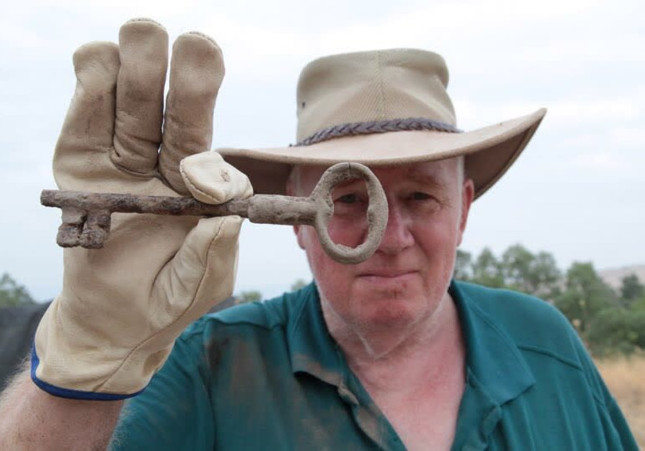
Archaeologist at biblical city of Zer. (photo credit: HANAN SHAPIR)
Archaeologists have uncovered the entrance gate to the biblical city of Zer during excavations carried out in the Golan Heights over the past two weeks, the Golan Regional Council said Sunday.
In recent days, and after a year of recess, a group of 20 archaeologists from all over the world, together with director of the Bethsaida Project, Dr. Rami Arav, and under the auspices of the Hebrew Union College, Jerusalem, conducted new excavations in two different areas of Bethsaida. The ancient fishing village is mentioned several times in the New Testament as a city where Jesus lived and where he miraculously fed a multitude of people with five loaves and two fish.
Archaeologists said the size, wealth and impressive fortifications indicate that Zer was a major city.
“There are not many gates in this country from this period. Bethsaida was the name of the city during the Second Temple period, but during the First Temple period it was the city of Zer,” Arav said, pointing to Joshua 19:35, which says: “The fortified towns were Ziddim, Zer, Hammath, Rakkath, Kinnereth.”
Arav began carrying out excavations of et-Tell on behalf of the University of Nebraska nearly 30 years ago. In these excavations, he identified the ancient Bethsaida, and following his excavations and discoveries, masses of Christian pilgrims visited the site because of its great importance to Christianity.
Over the years, excavators have discovered in Bethsaida many remains from various periods. The excavations are conducted in the Jordan Park area, northeast of the Sea of Galilee.
Avi Lieberman, director of the Jordan Park in which Bethsaida is located said: “The staff at the Jordan Park and the Golan Tourism are happy for the tens of thousands of visitors who visit the park every day. The wonderful park is also an impressive archaeological site. I amazed each time by the arrival of thousands of evangelical visitors to Bethsaida. I am confident that the latest discoveries will bring more visitors to the park from around the world and from Israel.”
Another finding made in the past two weeks was discovered underneath what was seemingly the floor of a Roman temple built by Herod’s son Philip, which he dedicated to Julia, the daughter of Augustus.
There archaeologists found coins, beads, jugs and house keys as well as a shield that belonged to a Roman soldier. The most significant finding was a coin dated to 35 BCE, which was minted in Acre on the occasion of the arrival of Cleopatra and Marc Antony. There is a total of 12 of these coins.
Over the years various findings made in the area have made waves in the world of archaeology. Several years ago, a gold coin bearing the portrait of Roman Emperor Antoninus Pius, who reigned from 138 to 161 CE, was discovered by an excavator working with Arav.
***
FOX NEWS
Amy Coney Barrett criticized for ties to People of Praise: A look at the group
By Kaitlyn Schallhorn
July 6, 2018

Amy Coney Barrett's faith came under question in 2017 when she was appointed to the U.S. Court of Appeals for the Seventh Circuit. She is reportedly on the short list for President Trump's Supreme Court pick. (University of Notre Dame Law School via AP)
If President Trump nominates Amy Coney Barrett to the Supreme Court, the federal judge can expect her second bruising round of confirmation hearings in less than a year and more of what supporters call "unfair criticisms" about her faith.
Barrett, 46, is one of six judges Trump has already interviewed to replace retiring Justice Anthony Kennedy on the bench. She is a federal appeals court judge who was appointed by Trump in 2017. Her Senate confirmation was anything but easy as she was grilled by Democrats about her religious background.
She once told a 2006 Notre Dame Law School graduating class that their “legal career is but a means to an end, and … that end is building the kingdom of God. … If you can keep in mind that your fundamental purpose in life is not to be a lawyer, but to know, love and serve God, you truly will be a different kind of lawyer.”
“The dogma lives loudly within you, and that’s of concern,” Sen. Dianne Feinstein, D-Calif., said during the September 2017 hearing.
When Sen. Dick Durbin, D-Ill. asked if she was an “orthodox Catholic” -- a term used in a paper she co-authored two decades before – Barrett clarified she is a “faithful Catholic” but would “stress my personal church affiliation or my religious belief would not bear on the discharge of my duties as a judge.”
After Barrett’s hearing, Princeton University President Christopher L. Eisgruber said he was “deeply concerned by the harsh and often unfair criticisms that are now routinely levelled from both sides of the political spectrum against distinguished judicial nominees who would serve this country honorably and well," including Barrett. He urged the Senate Judiciary Committee to “refrain from interrogating nominees about the religious or spiritual foundations of their jurisprudential views.”
Barrett’s connections to a charismatic organization, the People of Praise, has also come under fire, especially as she’s made it onto the short list of the president’s Supreme Court picks. Barrett’s critics have called the group a “cult” and believe it could cloud her judgment on the nation’s highest court.
Barrett was also a trustee of the Trinity School, an education program founded by the People of Praise, from 2015 to 2017.
Read on for a look at the People of Praise and how Barrett fits into the group.
So what is the People of Praise?
On its website, the People of Praise bills itself as a “Christian community of families and single people who seek to participate in the mission of the church in our time and to live our lives communally until the day when Jesus will be all in all.”
It has members of many denominations, although the majority are Catholic.
The religious group also says it understands it can be difficult for some people to understand as “we are a community that defies categories.”
When Barrett’s involvement with the group first drew criticism in 2017, Craig S. Lent, a People of Praise leader and University of Notre Dame professor, defended it as something that’s not “nefarious or controversial.”
“We don’t try to control people,” he told The New York Times. “And there’s never any guarantee that the leader is always right. You have to discern and act in the Lord.”
Aside from its schools, the People of Praise also does mission work, especially in low-income or high-crime neighborhoods in Indiana.
What is this about ‘handmaids'?
According to The Times, male leaders in the group are referred to as “heads” and women are called “handmaids.” But Lent said the group has decided to use “woman leader” instead of handmaid in recent years.
“We follow the New Testament pattern of asking men to take on some spiritual responsibility for their families,” Lent said.
Is it political?
Bishop Peter Smith, an auxiliary bishop of the Diocese of Portland, Oregon, told the Catholic News Agency (CNA) the group is non-partisan.
“I know for a fact there are both registered Republicans and Democrats as well as independents in the People of Praise,” Smith said. He is a part of the Brotherhood of the People of Praise, which CNA said is an association of priests who are connected to the organization.
Lent also told The New York Times the group would never tell a person in a political or judicial office "how to discharge their responsibilities.”
How does one join the group?
One can join the People of Praise after what it calls “an initial period of discernment and preparation” -- something that can take as long as six years. After that, an individual is asked to make a covenant of a “promise of love and service to fellow community members and to God.”
The covenant is not an oath or a vow, meaning it is not permanent.
How did it get its start?
The People of Praise began in 1971 in South Bend, Indiana, according to its website. Many of its founders were associated with the University of Notre Dame, the Catholic college where Barrett both studied and taught.
Now, there are 22 locations across the U.S., Canada and the Caribbean, according to its website. It boasts nearly 2,000 adult members.
What does this mean for Barrett?
Christians and conservatives have rushed to Barrett’s defense in wake of her reported inclusion on Trump’s short list for the Supreme Court.
Mona Charen, a senior fellow at the Ethics and Public Policy Center, wrote, “If Barrett is a glazed-eyed cultist, she’s done an incredible job of hiding it.” The Washington Examiner’s Becket Adams called the judge “the sort of person who pro-abortion advocates and other left-leaning activists would do and say anything to block from taking a Supreme Court seat.”
In a column for Bloomberg, Ramesh Ponnuru implored the president to pick Barrett.
“If Democrats want to make a case against Barrett’s religion again, but with the added publicity a Supreme Court nomination would bring, it probably would not play better,” Ponnuru said.
Catholic League President Bill Donohue said Feinstein and Durbin should recuse themselves from the vote if Barrett is Trump’s pick because of their “anti-Catholic bias.”
“Not to do so would be intellectually dishonest and patently unfair to Judge Barrett,” Donohue said.
Barrett’s faith could pose a challenge to future court decisions regarding abortion, a practice that most Christians and Catholics are fundamentally opposed to.
On the landmark Roe v. Wade ruling that legalized abortion, Barrett has said, “I’m sure every nominee before you would have personal beliefs about that precedent and many others. But all nominees are united in their belief that what they think about a precedent should not bear on how they will decide cases.”
Two years ago, just before the presidential election, she said she didn’t think that the “core case” of Roe v. Wade would be overturned.
“I think the question of whether people can get late-term abortions -- how many restrictions can be put on clinics -- I don’t think that will change,” she said.
She described abortion as “always immoral” on a White House questionnaire last year. But she said then, “If I am confirmed, my views on this or any other question will have no bearing on the discharge of my duties as a judge.”
Fox News’ Bill Mears, Alex Pappas and The Associated Press contributed to this report.
***
Gatestone Institute
International Community Ignores Genocide of Christians in Nigeria
By Raymond Ibrahim
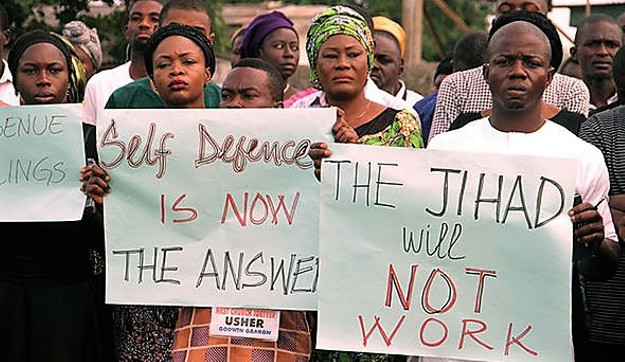
In what the Christian Association of Nigeria is calling a “pure genocide,” 238 more Christians were killed and churches desecrated by Muslims last week in the west African nation. This brings the death toll of Christians to more than 6,000 since the start of 2018.
According to a joint statement by the Christian Association, an umbrella group of various Christian denominations, “There is no doubt that the sole purpose of these attacks is aimed at ethnic cleansing, land grabbing and forceful ejection of the Christian natives from their ancestral land and heritage.”
The statement condemned the recent attacks, “where over 200 persons were brutally killed and our churches destroyed without any intervention from security agencies in spite of several distress calls made to them.”
The statement adds that the majority of those 6,000 Christians massacred this year were “mostly children, women and the aged… What is happening in … Nigeria is pure genocide and must be stopped immediately.”
The details of the murder of these thousands, though seldom reported, are often grisly: many were either hacked to death or beheaded with machetes; others were burned alive (including inside locked churches or homes); and women are often sexually assaulted or even raped before being slaughtered.
For long, both the Nigerian government and the U.S. government have sought to present this protracted jihad as territorial clashes between the haves (apparently always Christians) and haves-not (apparently always Muslims).
For instance, in 2012, Bill Clinton said that “inequality” and “poverty” are “what’s fueling all this stuff” (the “stuff” being a reference to the ongoing Muslim slaughter of Christians in Nigeria). Following the 2012 Easter Day bombing of a Nigerian church that left 39 worshippers dead, former U.S. Assistant Secretary of State for African Affairs, Johnnie Carson, said, “I want to take this opportunity to stress one key point and that is that religion is not driving extremist violence” in Nigeria. Similarly, the Obama administration reportedly agreed to spend $600 million in a USAID initiative launched to ascertain the “true causes” of unrest and violence in Nigeria—which naturally lay in the socio-economic, never the religious, realm.
However, in its recent statement, the Christian Association of Nigeria denied all these claims. After saying that those responsible for slaughtering Christians are always allowed to “go scot free” by the Nigerian government—which further portrays the attacks as “farmers/herdsmen clashes”—it inquired: “How can it be a clash when one group [Muslims] is persistently attacking, killing, maiming, [and] destroying, and the other group [Christians] is persistently being killed, maimed and their places of worship destroyed? How can it be a clash when the herdsmen are hunting farmers in their own villages/communities and farmers are running for their lives?”
On May 2, the National Christian Elders Forum—a wing of the Christian Association, the members of which average the age of 75 and come from Nigeria’s six geo-political zones—met the British High Commission in an effort to solicit support. (Days before that meeting, around 30 Muslim herdsmen stormed a church during early morning mass and massacred nearly 20 parishioners and two clergymen.)
Some of the more telling points in the group’s executive summary of issues follow:
It is clear to the Christian Elders that JIHAD has been launched in Nigeria by the Islamists of northern Nigeria led by the Fulani ethnic group [the “herdsmen”]. This Jihad is based on the Doctrine of Hate taught in Mosques and Islamic Madrasas in northern Nigeria as well as the supremacist ideology of the Fulani. Using both conventional (violent) Jihad, and stealth (civilization) Jihad, the Islamists of northern Nigeria seem determined to turn Nigeria into an Islamic Sultanate and replace Liberal Democracy with Sharia as the National Ideology. The object of course, is to supplant the Constitution with Sharia as the source of legislation. The current 1999 Constitution is plagued with dual conflicting ideology of Democracy and Sharia. There are certain values which are non-negotiable in a pluralistic society and it seems the advocates of the Caliphate do not respect this. A dual-ideology-driven Nigeria cannot be the Nigeria of our dream. We want a Nigeria, where citizens are treated equally before the law at all levels…. Bearing in mind that Christians constitute over 50% of the Nigerian population, the goal of the Islamists is bound to create serious conflicts which if not checked is capable of escalating into another civil war. Already, the Islamists are murdering Christians with impunity and destroying vulnerable Christian places of worship and communities at an alarming and inhuman rate.
That 6,000 Christians, “mostly children, women and the aged,” have been butchered in just the first six months of this year is a reminder of how violence only escalates when left unchecked, which is the story of the Muslim persecution of Christians in Nigeria.
For example, it took three times as long (a year-and-a-half, between December 2013 to July 2015), for the same Muslim herdsmen to slaughter only 1,484 Christians (532 men, 507 women, and 445 children), critically wound 2,388 Christians (1,069 men, 817 women, and 502 children), and burn or destroy 171 churches.
But the Nigerian government and the international community have from the start done little to address the situation—which is unsurprising since they cannot even acknowledge its roots, namely, the intolerant ideology of jihad. As a result, the death toll of Christians has only risen—and will likely continue to grow exponentially through the years, until such time that reality is not only acknowledged but properly addressed.

***
Zero Hedge
Polish Politician Warns Of Europe's "Degenerate Liberalism"
By Tyler Durden
July 10, 2018
Authored by Tunku Varadarajan, originally published op-ed at The Wall Street Journal,
As the North Atlantic Treaty Organization prepares for its annual summit this week, there is much talk about tensions between Europe and Donald Trump’s United States. But just as the American public is divided over Mr. Trump, Europe has its own deep fissures. The most prominent example is Brexit, Britain’s vote, months before Mr. Trump’s election, to leave the European Union. A close second may be the EU’s clash with Poland, its largest Eastern European member.
One reason Poland infuriates the EU, according to Ryszard Legutko, is Warsaw’s unswerving pro-Americanism. After Brexit, Poland will be “the most Atlanticist country in the EU,” says Mr. Legutko, a professor of ancient philosophy who also represents Poland’s conservative governing party at the European Parliament.
“That’s why we have the notion of strengthening the eastern flank of NATO with American troops,” he tells me in an interview at the Polish Consulate in Manhattan. “I do not think that a substantial reduction of the U.S. military presence in Germany will happen soon, but one cannot exclude such a possibility, once we remember how quick President Trump can be in taking decisions.”
If Mr. Trump is a harsh critic of American elites, Mr. Legutko plays that role, albeit with a less demotic style, in the European context. In his 2016 book, “The Demon in Democracy: Totalitarian Temptations in Free Societies,” he writes:
“The European Union reflects the order and the spirit of liberal democracy in its most degenerate version.”
That, he tells me, is why the EU “doesn’t merely have individual dissidents in its midst, but also dissident states.”
The prevailing EU attitude “not only toward Trump, but also toward Hungary, Poland, Italy and other dissident governments,” he says, is that they are “accidents, unnatural deviations, that could and will be quickly corrected.”
In the Polish case, Brussels is attempting to apply some muscle toward that end. Poland’s governing Law and Justice Party enacted a law, which took effect this week, imposing a retirement age of 65 on the country’s Supreme Court judges. The aim was to force out some long-sitting liberal jurists and replace them with more-conservative ones. Brussels accuses Poland of violating the EU treaty and is threatening to suspend the country’s voting rights in the union.
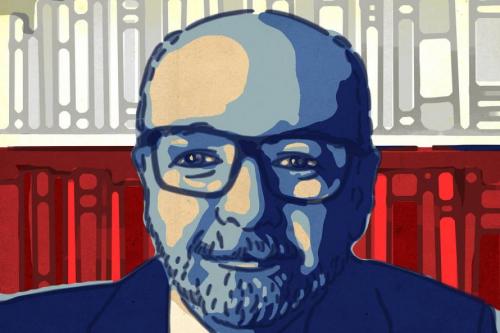
“More than 80% of Poles want the legal system to be reformed,” Mr. Legutko says indignantly. “They have had a very bad experience with the courts.” In the Polish Supreme Court—“a body of 100 judges, so with nothing in common with the U.S. Supreme Court”—there are “still members who faithfully and shamelessly served the communist regime in the past.” After communism’s fall in 1989, he says, there were “only 48 cases of judges being charged with collaborating with the communist regime by legalizing its political repression.” In 42 of these cases, the disciplinary courts refused to start legal proceedings. “In five cases, the judges were acquitted. Only one judge was found guilty.”
The Polish government insists its actions are a necessary debridement of the judiciary’s rotten corpus. The EU disagrees, Mr. Legutko says, because “it is liberalism incarnate.” In his book, he writes that “Poland shook off the communist yoke at a time when the Western world had already reached a phase of considerable homogeneity and standardization.” The smart set in Brussels finds the Poles irritating, he tells me, because they want Poland to be “indistinguishable from other EU nations.” An “exotic Poland” that pursues its own political course is unacceptable.
The EU’s elites, Mr. Legutko says, are unbending in their belief that “one has to be liberal in order to be respectable, that whoever is not a liberal is either stupid or dangerous, or both.”
Seconds later, he corrects himself: “I mean the elites of the West, including those of the United States. Being liberal is the litmus test of political decency. This is today’s orthodoxy. If you criticize it, or you’re against it, you’re disqualified.” The world has “shrunk,” Mr. Legutko laments, “and the liberal paradigm seems to be omnipresent.”
What is that paradigm?
“A liberal is somebody who will come up to you and tell you, ‘I will organize your life for you. I will tell you what kind of liberty you will have. And then you can do whatever you like.’”
His response—and Poland’s as a sovereign entity—is unequivocal:
“Don’t organize my liberty for me. Do not try to create a blueprint according to which an entire society must function.”
That’s why, he says, Poland is “a dissident member of the EU, and the primary reason why it has been attacked so much. Not because we did something outrageous, but because of who we refuse to be.”
Hungary, under Viktor Orbán, is also an EU dissident. It was, Mr. Legutko says, “the first to be attacked by the elites because of Prime Minister Orbán’s rejection of liberal ways.” But he thinks Brussels sees Poland as a bigger threat:
“Hungary is a small country. Poland is not. The criticism is severe because we are more important, in a way.” What goes down particularly badly with the conservative government in Warsaw is the “condescension” of France and Germany:
“They say to Poland, ‘Why are you making so much noise? Why are you doing all of this? You were part of the club before. You received all sorts of benefits. Isn’t what you got enough?’”
No, Mr. Legutko answers. All these “benefits”—such as the elevation of former Polish Prime Minister Donald Tusk to the presidency of the “toothless” European Council—mask the disproportionate division of power within the EU. Equality of member states exists only on paper: “The big players use the European institutions to serve their own interests, and the political architecture condemns everyone else to subordinate status.” He says this could become “unbearable” for Poland, especially after Britain’s departure.
You might think Mr. Legutko would sympathize with Brexit, but he regards it as a nightmare. “It was very bad for Poland, and very bad for the EU, because Britain had been a country of common sense.” He describes the response of European leaders: “First, they started by insulting the Brits—they were fooled, they were duped, they were illiterate. The old senile Brits and the uneducated young were those who voted to leave, and those who were intelligent voted to remain.” That reaction, he says, is “typical. You cannot behave differently from us without being a fool.” For an American, the word “deplorable” comes to mind.
Could there someday be a Polish exit from the EU? No, Mr. Legutko says emphatically. “We will probably be the last to leave the EU. We will switch off the lights.” The Poles overwhelmingly favor the union but are concerned about its direction: “Polish history has been very turbulent, as you know. We lost our independence for a long time. So even as we join the world, we are very watchful of our sovereignty, very sensitive about it.”
That watchfulness can shade into hypersensitivity.
An obvious example is the law passed recently criminalizing speech that imputes to Poland complicity in the Holocaust. Mr. Legutko prickles when I ask about the law, taking care to point out that he’s “not extremely enthusiastic about it.” But he says it is a “reaction to the widespread use of the phrase ‘Polish concentration camps’ and ‘Polish death camps’ in the media. We did not establish them. We did not control them. There were concentration camps in France, but nobody calls them ‘French concentration camps.’” Mr. Legutko says that he, like many Poles, “agrees with this antidefamation law’s intention and sees nothing objectionable with its text,” but he does concede that it is likely to prove “counterproductive.”
It irks Mr. Legutko that many of the countries that criticize Poland for its Holocaust law have their own legal curbs on speech. That inconsistency appears to reinforce his weariness with the West. “Under the old communist regime, the West was considered an alternative to communism. It was a hope, a place in which one could find refuge from an oppressive and stifling ideology.” Such refuge could be temporary, for “a student who obtained a scholarship in France or Britain,” or permanent, for one who defected. But for those who stayed in Poland, “even watching American or British movies, reading books, or listening to the radio was like a breath of fresh air.”
Mr. Legutko says that “this feeling that there is a different world, unlike the one I live in, is disappearing because of the homogenization of Western culture.” The results are depressing. “Wherever one goes, from Germany to New Zealand, one finds oneself in the power of the same liberal ideology, the same jargon.” Dissenters, he says, are few and marginalized. An incorrect utterance can lead to swift, career-ending reprisals.
Paradoxically, in Mr. Legutko’s view, one now finds greater diversity and freedom of thought in some of the former communist countries, including Poland: “Political correctness is less oppressive, and there are influential nonliberal ideas. The fact that the Catholic Church is strong in Poland makes a difference, because it gives us a mental and spiritual access to ideas and sensibilities that have evaporated in the secular West.
“We often say, half-jokingly and half-seriously, that now Poland may become a country to which people will defect”—people “from France, the Netherlands or Britain.”
***
THE SUN
TRUMP'S BREXIT BLAST
I told May how to do Brexit but she wrecked it — the US trade deal is off, says Donald Trump
In a world exclusive interview with The Sun, the US President said Theresa May had ignored his advice by opting for a soft Brexit strategy
EXCLUSIVE
By Tom Newton Dunn, Political Editor in Brussels
12th July 2018, 10:59 pm
Updated: 13th July 2018, 7:27 am
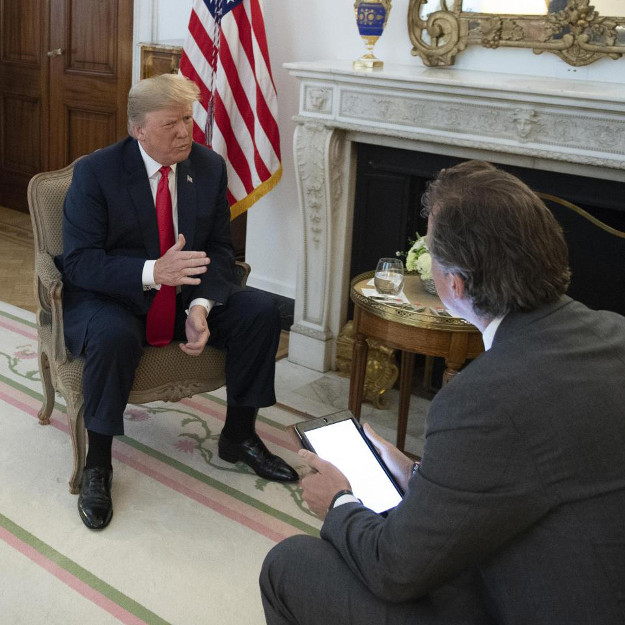
DONALD Trump today accuses the PM of wrecking Brexit — and warns she may have killed off any chance of a vital US trade deal.
The US President delivers his incendiary verdict on her negotiating strategy in a world exclusive interview with The Sun.
In an extraordinary intervention timed to coincide with his UK visit, Mr Trump said Theresa May ignored his advice by opting for a soft Brexit strategy.
And he warned her any attempts to maintain close ties with the EU would make a lucrative US trade deal very unlikely.
Mr Trump said: “If they do a deal like that, we would be dealing with the European Union instead of dealing with the UK, so it will probably kill the deal.”
His comments, damaging to the Prime Minster, come as he delivers his most brutally honest verdict yet on Britain in which he also:
Accused EU leaders of destroying its culture and identity by allowing in millions of migrants
Tore into London Mayor Sadiq Khan for not standing up to terrorists
Blamed Khan for spiralling crime in the capital
Insisted former Foreign Secretary Boris Johnson would make “a great Prime Minister”
Denied once branding Theresa May a “bossy schoolteacher”
Maintained he would keep ties with Russian tyrant Vladimir Putin despite the Salisbury Novichok poisonings
Demanded Britain and other Nato countries spend more on defence
Spoke of his sadness at feeling unwelcome in the capital by anti-Trump protesters
Claimed millions of Brits backed his policies
Told of his pride at taking wife Melania to meet the Queen
Mr Trump’s remarks come as he prepares to meet the PM for a working lunch at Chequers.
He will then board a helicopter for Windsor Castle to meet the Queen before flying up to Scotland for a private two-day visit.
Thousands of people are expected to take part in a series of protests during his stay in the UK.
THERESA May’s new soft Brexit blueprint would “kill” any future trade deal with the United States, Donald Trump warns today.
Mounting an extraordinary attack on the PM’s exit negotiation, the President also reveals she has ignored his advice on how to toughen up the troubled talks.
Instead he believes Mrs May has gone “the opposite way”, and he thinks the results have been “very unfortunate”.
His fiercest criticism came over the centrepiece of the PM’s new Brexit plan — which was unveiled in full yesterday.
It would stick to a common rulebook with Brussels on goods and agricultural produce in a bid to keep customs borders open with the EU.
But Mr Trump told The Sun: “If they do a deal like that, we would be dealing with the European Union instead of dealing with the UK, so it will probably kill the deal.
“If they do that, then their trade deal with the US will probably not be made.”
Mr Trump made the bombshell intervention during a world exclusive interview with The Sun — the only British media outlet he spoke to before his arrival in the UK for his first visit as President.
It will pour nitroglycerine on the already raging Tory Brexiteer revolt against the PM.
And in more remarks that will set off alarm bells in No10, Mr Trump also said Mrs May’s nemesis Boris Johnson — who resigned over the soft Brexit blueprint on Monday — would “make a great Prime Minister”.
A big US-UK trade deal, long promised by Mr Trump, is cherished by Leave campaigners as Brexit’s biggest prize.
But the President said Mrs May’s plan “will definitely affect trade with the United States, unfortunately in a negative way”.
He explained: “We have enough difficulty with the European Union.
“We are cracking down right now on the European Union because they have not treated the United States fairly on trading.
“No, if they do that I would say that that would probably end a major trade relationship with the United States.”
Questioned on Boris’s comments at a private dinner two weeks ago that Mr Trump “would go in bloody hard” if he was negotiating Brexit, the President swiftly replied: “He is right.”
He added: “I would have done it much differently. I actually told Theresa May how to do it but she didn’t agree, she didn’t listen to me.
“She wanted to go a different route.
“I would actually say that she probably went the opposite way. And that is fine.
“She should negotiate the best way she knows how. But it is too bad what is going on.”
Asked if that meant he would be prepared to walk away from the negotiating table, Trump replied: “Oh, absolutely. I think what is going on is very unfortunate. Too long.
“You know, deals that take too long are never good ones. When a deal takes so long, they never work out very well.”
Mr Trump also went even further in questioning whether Mrs May’s new Brexit plan upholds the referendum result — which he claimed he predicted two years ago. He said: “The deal she is striking is a much different deal than the one the people voted on.
“It was not the deal that was in the referendum. I have just been hearing this over the last three days. I know they have had a lot of resignations. So a lot of people don’t like it.”
Despite the withering criticism of Mrs May’s Brexit strategy, Trump insisted he still thinks she is “a very good person”.
He also denied claims that she bores him.
Asked about a report in The Washington Post that he thinks of Mrs May as “a bossy schoolteacher”, Mr Trump said: “No, no, no, no. I never said anything bad about her.
“That is fake news. I think she is a nice person. I get along with her very nicely. The Washington Post is totally fake. They are just a lobbyist for Amazon.”
Recalling a visit to one of his luxury golf resorts in Scotland two years ago, Mr Trump said: “I predicted Brexit.
“I was cutting a ribbon for the opening of Turnberry — you know they totally did a whole renovation, it is beautiful — the day before the Brexit vote.
“I said, ‘Brexit will happen’. The vote is going to go positive, because people don’t want to be faced with the horrible immigration problems that they are being faced with in other countries.
“You remember that Barack Obama said that there is no way it is going to happen, and the UK will get to the back of the line if it ever does, right? I said Brexit will happen, and I was right.”
At a press conference in Brussels yesterday at the end of a summit of Nato leaders, Mr Trump again cast doubt on whether the PM’s soft Brexit plan was true to the referendum result.
He said: “I don’t know if that’s what they voted for.”
Downing Street was left shell-shocked by the criticism.
Mrs May rushed out her own statement to hit back at the President’s claim.
The PM insisted: “We have come to an agreement at the proposal we’re putting to the European Union which absolutely delivers on the Brexit people voted for.
They voted for us to take back control of our money, our law and our borders and that’s exactly what we will do.”
***
EXPRESS
Sky's the limit! Trump ready to offer 'ZERO TARIFF' trade deal to make Brexit Britain BOOM
DONALD Trump is ready to offer Theresa May a "zero tariff" trade deal to help get Brexit Britain booming, his ambassador has revealed.
By TIM NEWARK AND MACER HALL EXCLUSIVE
July 7, 2018
US ambassador Robert Woody Johnson is enthusiastic about a UK-US trade deal
Diplomat Robert 'Woody' Johnson said the US President - due to visit the UK next week - wants a "quick deal" to drastically increase trans-Atlantic trade between the "special relationship" allies after Britain quits the EU.
"The President thinks it’s time to go," he said, adding: "The sky's the limit."
The offer, which could slash the prices of US imports for British consumers and boost job creation on both sides of the Atlantic, was hailed as a massive vote of confidence in the UK's future outside the European bloc.
And it came as the Prime Minister edged close to an EU departure deal with Brussels by winning Cabinet backing for her Brexit plans.
Aides said a crunch meeting of the full Cabinet at Chequers, Mrs May's countryside retreat, saw "constructive and positive" discussions after months of wrangling between ministers.
Mr Johnson laid bare White House's enthusiasm for accelerating talks on a UK-US trade in an exclusive interview with the Daily Express ahead of Mr Trump's long-awaited first official UK visit since becoming president.
He is due to meet the Queen at Windsor Castle, hold talks with Mrs May at Chequers and will be welcomed with a back-tie banquet at Blenheim Palace, the birthplace and ancestral home of Winston Churchill.
Speaking at the new US Embassy complex in south London, Mr Johnson confirmed that "zero tariffs" on all trade between Britain and the UK could be the starting point for negotiations on a post-Brexit deal between the two allies.
“I think it would be bold and why not start off with that premise,” he said.
“The President will put his full energy behind a quick deal.
Mr Johnson said the president instinctively wanted to seize the moment to agree a post-Brexit trade deal with the UK as soon as possible.
“As an American you want to get on with it and make a deal quickly so business people can organise around this.
“We would encourage movement. The President thinks it’s time to go," the London-based ambassador said.
In his interview, Mr Johnson was also optimistic about Britain's prospects outside the EU.
“The sky’s the limit. As an independent nation you will be agile, nimble, attract capital. You’ve got so much capability here. It will be nice to see you go at full tilt," he said.
“It will show the strength of the Special Relationship we have.
"We’ve got to remember that Britain is a valued partner, the likes of which we don’t have anywhere else.”
He added: “You’ve got something really special here - the language, the culture, history, legal system, the institutions that are the envy of the world. When you stand up on your own it will be something to watch.”
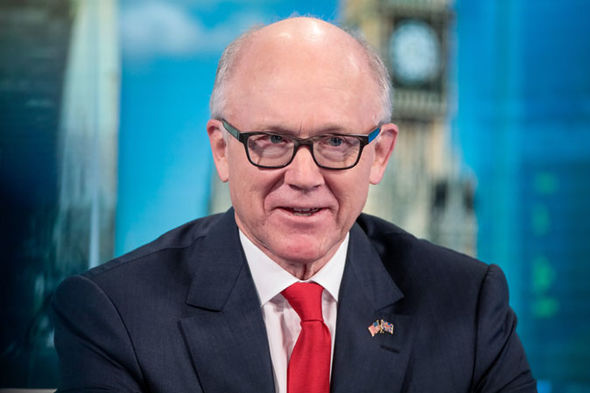
Mr Johnson also took a swipe at Brussels for resisting Mrs May's offer of full security cooperation between the UK and the EU after Brexit.
“It doesn’t make sense,” the ambassador said. “It’s illogical, particularly over something like terrorism. You have got to share.” He added: “I don’t know what their motivation is."
Brexit campaigners were delighted by the ambassador's positive remarks.
Tory MP Nigel Evans said: "This is brilliant news. We already have an excellent trade relationship with the US even before we do a trade deal.
"The special relationship between the UK and the US would be greatly enhanced by zero tariffs. It would be the best start for Brexit and a huge boost for jobs on both sides of the Atlantic."
And the accelerating moves towards a trade deal came as the US and China slapped tit-for-tat duties worth £26billion on each other goods last night.
Beijing accused the Trump administration of triggering the "largest-scale trade war" following the exchange.
Chinese Premier Li Keqiang said: "Trade war is never a solution."
He added: "China would never start a trade war but if any party resorts to an increase of tariffs then China will take measures in response to protect development interests."
Mr Trump hit back by suggesting the US could target around £380billion-worth of Chinese imports.
A Chinese state media report accused the US government of acting like "a gang of hoodlums".
"In effect, the Trump administration is behaving like a gang of hoodlums with its shakedown of other countries, particularly China," the state-run China Daily newspaper said.
"It’s unruliness looks set to have a profoundly damaging impact on the global economic landscape in the coming decades, unless countries stand together to oppose it."
***
BBC
Brexit Secretary David Davis resigns
July 9, 2018
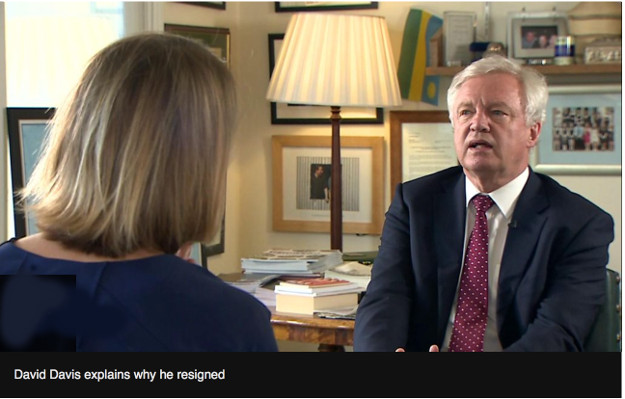
David Davis, who has been leading UK negotiations to leave the EU, has quit his role as Brexit Secretary
He told the BBC that he was no longer the best person to deliver the PM's Brexit plan - agreed by the cabinet on Friday - as he did not "believe" in it.
He said the "career-ending" decision was a personal one but he felt the UK was "giving away too much and too easily" to the EU in the negotiations.
Mrs May said she did not agree but thanked him for his work.
The resignation is a blow to Mrs May as she seeks to win over Eurosceptic MPs to her proposed Brexit vision, which would form the basis of the UK's position in on-going talks with the EU.
Dominic Raab, who campaigned for Leave during the UK's 2016 EU referendum, has been promoted from housing minister to take over from Mr Davis.
The UK is due to leave the European Union on 29 March 2019, but the two sides have yet to agree how trade will work between the UK and the EU afterwards.
There have been differences within the Conservative Party over how far the UK should prioritise the economy by compromising on issues such as leaving the remit of the European Court of Justice and ending free movement of people.
Mrs May's Conservative Party only has a majority in Parliament with the support in key votes of the 10 MPs from Northern Ireland's Democratic Unionist Party, so any split raises questions about whether her plan could survive a Commons vote - and has also led to renewed questions about whether she will face a challenge to her position.
In a sign of how delicately positioned the numbers are on Brexit strategy it has emerged that the government has taken the unusual step of arranging a briefing for opposition Labour MPs on the detail of the Brexit plan agreed on Friday.
In his resignation letter, Mr Davis told Mrs May that "the current trend of policy and tactics" was making it "look less and less likely" that the UK would leave the customs union and single market.
He said he was "unpersuaded" that the government's negotiating approach "will not just lead to further demands for concessions" from Brussels.
Mr Davis, who was appointed Brexit Secretary in 2016, said: "The general direction of policy will leave us in at best a weak negotiating position, and possibly an inescapable one."
In her reply, Mrs May said: "I do not agree with your characterisation of the policy we agreed at cabinet on Friday."
She said she was "sorry" he was leaving but would "like to thank you warmly for everything you have done... to shape our departure from the EU".
Mr Davis told BBC Radio 4's Today programme that he had objected to Theresa May's plan at the Chequers meeting, telling cabinet colleagues at the outset that he was "the odd man out".
He said it was "not tenable" for him to stay in post and try to persuade Tory MPs to back the policy when he did not think it was "workable".
"The best person to do this is someone who really believes in it, not me."
He said he feared the EU would seek to further water down the UK's plans and his resignation would make it easier for the UK to resist attempts to extract further concessions.
Mr Davis told BBC political editor Laura Kuenssberg that he had been compromising for two years and that the latest plan was "a compromise too far".
But Mr Davis insisted he continued to back Theresa May, saying that if he "wanted to bring her down", the time would have been after she failed to win last year's general election outright.
A leadership contest now would be "the wrong thing to do", adding: "I won't throw my hat into the ring."
Eurosceptic MP Steve Baker has also resigned. He played a leading role in the Brexit campaign in the run up to the 2016 referendum. He was promoted to the Department for Exiting the EU as a parliamentary under-secretary in June last year.
Conservative MP Peter Bone hailed Mr Davis's resignation as a "principled and brave decision", adding: "The PM's proposals for a Brexit in name only are not acceptable."
Labour Party chairman Ian Lavery said: "This is absolute chaos and Theresa May has no authority left."
***
RT
British Foreign Secretary Boris Johnson resigns - Downing Street
July 9, 2018
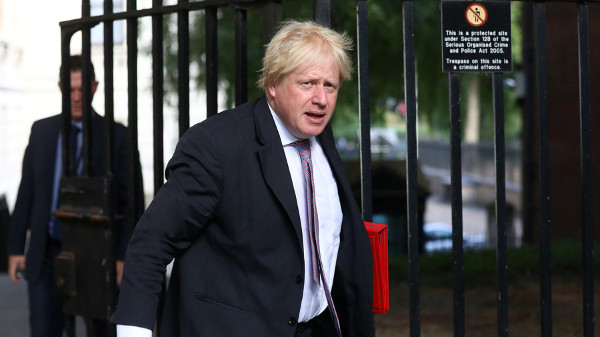
© Simon Dawson / Reuters
Boris Johnson has resigned as British foreign secretary, Downing Street has confirmed. It represents yet another blow to the government of Theresa May, who is pushing for a soft Brexit plan that has angered many conservatives.
"This afternoon, the prime minister accepted the resignation of Boris Johnson as foreign secretary. His replacement will be announced shortly. The prime minister thanks Boris for his work," Downing Street said in a statement.
The resignation comes after it was previously reported that he referred to selling May's Brexit plan as "polishing a turd."
Johnsons's quitting follows that of the Brexit secretary, David Davis, and his No 2 at the Department for Exiting the EU, Steve Baker. Rumors began swirling earlier on Monday that Johnson would be leaving his post, as he was hold up in his residence with his closest advisers, missing a scheduled appearance at the West Balkans summit. There were also reports that he missed a Cobra meeting about the Wiltshire novichok poisoning.
***
Until
next week...keep on believing.
Almondtree Productions
“If
a house be divided against itself, that house cannot stand.”
(Mark
3:25)